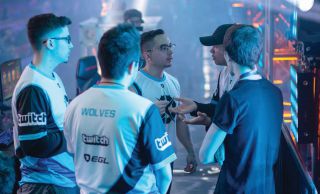Cultivate a successful sport, or so the theory says, and get the benefits in another part of your game. I've heard several variations on this idea over years of writing in esports, where companies sometimes talk about professional games in terms similar to the leaders of supermarket losses: they are not profitable in themselves but can attract players who Then they spend money on the game. But a new partnership between Emory University and the publisher Hi-Rez Studios aims to put that theory to the test.
"We've always believed that watching esports helps our gaming business," says Todd Harris, co-founder of Hi-Rez and president of its broadcasting subsidiary, Skillshot Media. "There was a great interest in the community to play, [and] the publishers began to support that with cash prizes, structures, and casting and production."
He continues: "The publishers did that because they thought that supporting the esports from a commercial point of view, those fans will play the game for longer, maybe even spend more money, so I think many editors have this intuition. someone has done an investigation that says: 'Yes, that can be quantified.' "
This is where Professor Mike Lewis's team at Emory University comes in. Lewis is the director of the Center for Analysis marketing, where his research ranges from traditional sports to politics, he has been aware of sports and Harris is a guest speaker on his sports analysis course. "Over time, I think we have just discovered a mutual interest in understanding the fandom, "says Lewis." Hi-Rez has the data and Emory can provide some academic horsepower. "
His initial hypothesis is that esports will increase commitment ( measured in terms of playing, winning and winning purchases) "because it provides a focal community or a place for interaction". Testing this claim involves trying to isolate how behavior changes when players watch sports. "What we do is try to build samples of observers and non-observers who have very similar activity levels before exposure to sports programming."
Respecting privacy
In case (Harris asks about the sensitivity and granularity of the data of the players involved, Harris tells me that it is anonymous when they pass it to Emory: "The data is anonymized to not include attributes like gender, age and other things. "Lewis adds:" We are very respectful of player privacy. "We never look at any individual level that identifies information beyond the country of origin."
How (or if) sports affect engagement with the underlying videogame is just one of the approximately thousands of questions that Lewis and his team could use.Keep to illustrate that, there is a second initial project, this one that investigates Consumer behavior in the industry, therefore, how systems, such as rewards, leveling and community status, affect purchasing behavior. e my search for a dinosaur cosmetic in Dota 2 as a case study.
A better understanding of how a sport relates to the game on which it is based, obviously has the potential to impact business decisions of companies like Hi-Rez. For Harris, the research is of interest for two reasons. One is Hi-Rez's own participation in electronic sports as part of its business. The other is that, through Skillshot, they hope to provide a service to other editors with sports scenes.
A blank document is expected to describe the partnership's first findings in the first quarter of 2019. Harris tends to speak with the expectation that the research will confirm the idea that sports are good for a game. But there is always the possibility that the investigation may yield unexpected conclusions. What happens if the results are contrary to the intuitions of the editors?
Harris notes that Hi-Rez only makes competitive games and that his staff is a big fan of esports, so there is a personal investment and also commercial. "So, really, regardless of what the research returns, we do not see ourselves diminishing our investment." Outside the communities with knowledge of sports, there is a tendency to refer to sports as if they were a monolithic entity instead of a diverse set of communities. Genres, commercial structures and equipment. I ask Lewis how he is treating the idea of esports and how it is divided into areas.
Examining the esports
"This is an interesting question," he says. "One of my challenges in this association has been trying to understand the general landscape of sports. In traditional sports, many fandom behaviors can be traced back to how the leagues are organized. I do a lecture in class on the levels of control: you have sports ranging from the NFL with strict salary limits, income distribution, amateur turns to the wild west of professional boxing. The key point is that the way a sports category works (and how consumers behave) can generally be understood in terms of the organization of the league. "
The variety in the sports sector and the data available mean that Lewis is choosing to focus the team's research on trying to understand individual behavior at a fundamental level." This means starting from the first principles in Consumer psychology terms and take loose hypotheses to the data. "But, I will always be very direct in terms of what I do not know," he adds. "For me [it still looks] as a vast and expanding landscape. things that makes this an exciting partnership. "
Professor Mike Lewis published some information about the case study, and you can find more about his Emory blog .




Be First to Comment